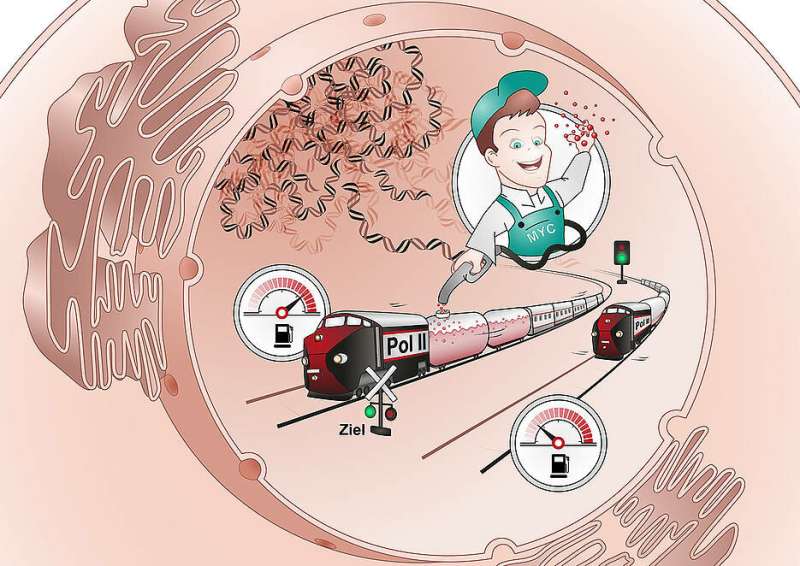A cellular protein as a 'gas pump attendant' of cancer development

The cells that make up the body vary significantly. A liver cell does not look like a muscle cell, and each has a unique function. This is because liver cells produce the proteins that characterize them, and muscle cells do the same. The blueprint of each human protein is saved in genes, which are the same in every single cell.
For cells with the same genetic material to be able to produce different proteins, certain "helper" proteins are necessary. The molecules responsible for this are called transcription factors – they make sure that only the correct genes are read and transcribed to create more of the proteins that are required.
The question of how transcription factors function has been investigated by Dr. Elmar Wolf, research group leader at the Biocenter of the Julius-Maximilians-Universität Würzburg, and his team. Recently, the researchers made a surprising observation, and the results of their study are now presented in Molecular Cell.
Apoorva Baluapuri, Dr. Wolf's doctoral student, explains this observation using an analogy: "One can imagine the reading of genes to be like a train ride. The cellular machinery which reads the genetic information sets off like a train at the beginning of a gene. Only when the train successfully reaches its final destination, the end of the gene, can it produce the corresponding protein."
Gas Pump Attendant and Signal Generator
Until recently, scientists have assumed that transcription factors control how many "trains" set off from the beginning of a gene, and so act as a traffic signal. The researchers in Wolf's group have recently observed that transcription factors do not solely increase the number of trains that leave the station, but make sure that all of the trains reach their final destination and don't get stuck halfway there. Julia Hofstetter, another doctoral student, investigated how transcription factors do this. She could show that transcription factors ensure that only trains that actually have all of the necessary things for the trip are able to leave the station. "One could say that transcription factors take the role of gas pump attendants," says Wolf.
Why is it interesting that transcription factors act more as a gas pump attendant than a traffic signal? "On the one hand, this basic molecular mechanistic knowledge is important to understand how different cell types arise in the human body," explains Wolf. "On the other hand, it's not only normal cells, such as liver and muscle cells which need transcription factors to survive. Also cancer cells use transcription factors to produce the proteins that they need to support their growth and division." This is how the transcription factor MYC, on which both young researchers work, contributes decidedly to most cancers.
Elmar Wolf and his team now hope that a better understanding of the function of transcription factors might reveal how inhibit this awful disease. Or, as Wolf puts it, "Wouldn't it be great if we could ensure that cancer cells are no longer able to grow because the trains are stuck due to fuel shortages?"
More information: Apoorva Baluapuri et al. MYC Recruits SPT5 to RNA Polymerase II to Promote Processive Transcription Elongation, Molecular Cell (2019). DOI: 10.1016/j.molcel.2019.02.031
Journal information: Molecular Cell
Provided by Julius-Maximilians-Universität Würzburg





















